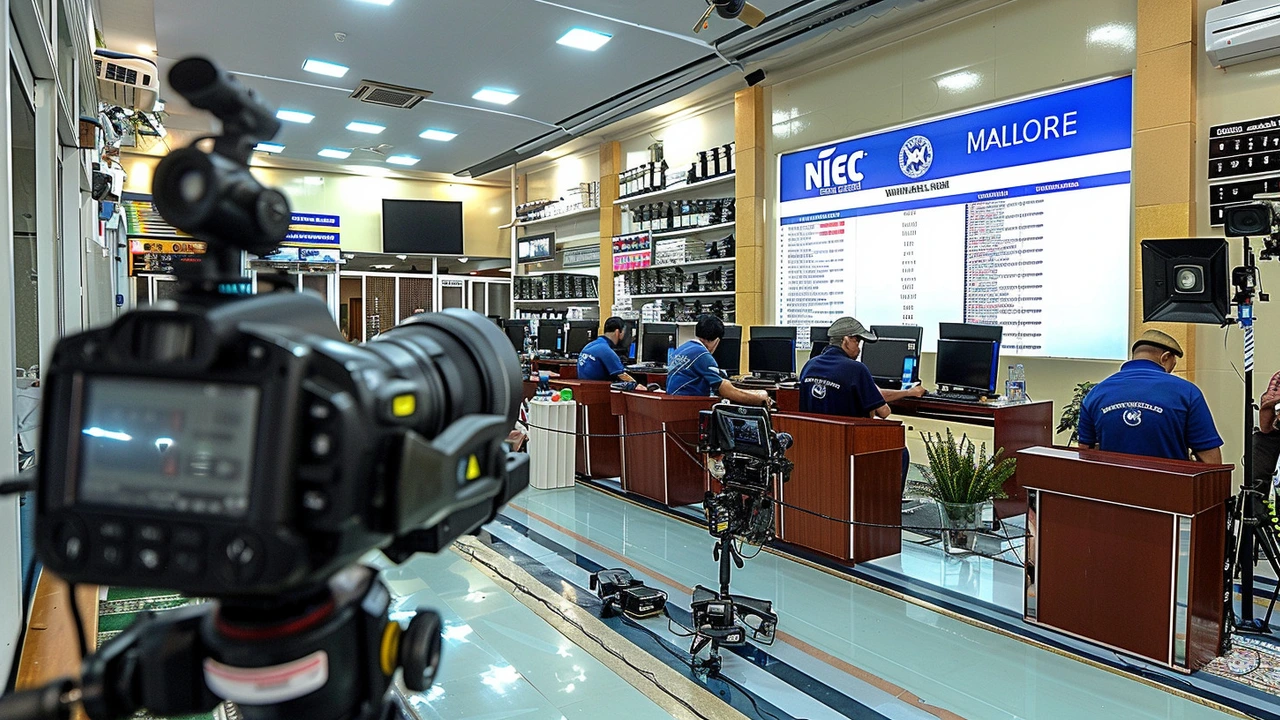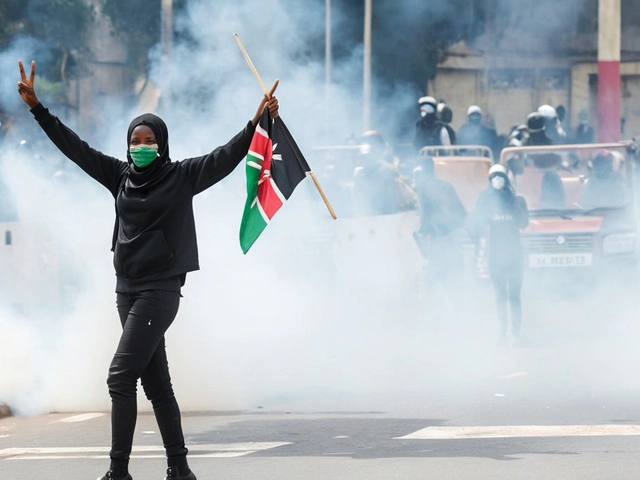Arrests for Alleged Election Tampering Confirmed
The Chief Electoral Officer of the Electoral Commission of South Africa (IEC), Sy Mamabolo, has announced the arrest of two individuals on allegations of tampering with election materials. This development has brought attention to the measures in place to safeguard the democratic process in South Africa.
According to Mamabolo, the arrests were carried out by the South African Police Service following two distinct incidents. In one scenario, representatives from an unspecified political party were caught trailing an IEC presiding officer. They went as far as handling a used ballot box, an action that contravenes election regulations and compromises the integrity of the electoral process. In the other incident, followers of another political party confronted a presiding officer at their residence, demanding an account of electoral materials. Such confrontations not only threaten the safety of electoral staff but also undermine the public's confidence in the electoral process.
Ensuring Electoral Integrity
Mamabolo emphasized the critical role all stakeholders must play in maintaining the legitimacy of elections. He noted that these arrests are a testament to the vigilance of the security measures in place and serve as a warning against any attempts to interfere with the electoral process. The IEC's commitment to ensuring free, fair, and secure elections is unwavering, and any actions to the contrary will be met with the full force of the law.
Despite the challenges, the IEC reported a significant milestone achieved during the special voting period. Over the course of two days, at least 937,000 voters were processed, a figure that surpasses the numbers recorded during the 2019 general elections. This increase in voter engagement during the special voting period is a positive indicator of a potentially high turnout on voting day.
Acknowledging Current Challenges
Mamabolo acknowledged the incidents but reassured the public that such occurrences are isolated and do not reflect the overall state of the electoral proceedings. He urged the public and political parties to collaborate with the IEC, highlighting the importance of trust and cooperation in upholding the democratic process. The priority is to ensure that the elections are conducted smoothly and that the results genuinely represent the will of the South African electorate.
The incidents of alleged tampering have brought to the forefront the importance of vigilance and adherence to electoral laws. The IEC has stringent guidelines and measures in place to prevent and detect tampering, and these recent arrests underscore the effectiveness of these safeguards. The focus now is on maintaining a transparent process to reinforce public confidence in the electoral system.
The Role of Political Parties
Political parties play a pivotal role in the democratic process, and their conduct during elections is crucial. Mamabolo called on all political entities to respect the rules and regulations set forth by the IEC. He reiterated that the integrity of the elections depends on every stakeholder's adherence to the established protocols. The IEC's mandate is to facilitate a fair platform where the voice of every voter is heard and respected.
It is essential for political parties and their representatives to exhibit responsible behavior and refrain from any actions that could potentially compromise the electoral process. The actions of a few individuals should not tarnish the collective effort to conduct free and fair elections. Political parties must educate their members on the importance of following proper electoral procedures and the serious consequences of any form of interference.
Looking Forward to Voting Day
As South Africa approaches the official voting day, the IEC remains optimistic about the turnout. The high number of voters processed during the special voting period is an encouraging sign. The IEC has ensured that all necessary preparations are in place to accommodate the anticipated voter turnout and to address any challenges that may arise.
Mamabolo encouraged all eligible voters to participate in the upcoming elections. He stressed that every vote counts and that the participation of the electorate is crucial in shaping the future of South Africa. The IEC is committed to creating an environment where voters can exercise their rights without fear or intimidation.
Final Thoughts
The recent arrests for alleged election tampering serve as a reminder of the importance of vigilance in safeguarding the democratic process. The IEC's swift response to these incidents demonstrates its commitment to maintaining the integrity of the elections. As the nation prepares for voting day, the collaborative efforts of the public, political parties, and the IEC will be pivotal in ensuring a successful and democratic election.
With over 937,000 voters already processed during the special voting period, there is a strong indication that South Africans are eager to have their voices heard. The IEC's focus remains on providing a fair and transparent electoral process that reflects the will of the people. By working together, South Africa can continue to strengthen its democracy and uphold the values of free and fair elections.







JAN SAE
Great job staying vigilant, everyone!!! The IEC's quick action sends a crystal‑clear signal that tampering won't be tolerated!!! Keep up the community spirit and watch those ballots like hawks!!! Together we’ll safeguard democracy!!!
Steve Dunkerley
The procedural integrity outlined in the Electoral Act, particularly sections 45‑47, mandates strict chain‑of‑custody protocols for ballot materials. Non‑compliance not only violates statutory obligations but also undermines the statistical validity of the electoral dataset. In forensic terms, the interception of a used ballot box constitutes a breach of the evidence‑preservation chain, potentially contaminating the audit trail. Therefore, the arrests reinforce both legal deterrence and operational resilience within the electoral ecosystem.
Jasmine Hinds
Love the transparency, keep it up 😊
Madison Neal
The incident underscores the necessity for robust stakeholder engagement frameworks, especially when dealing with partisan operatives. By reinforcing the chain‑of‑custody and reinforcing situational awareness, the IEC mitigates risk of procedural anomalies. Moreover, the surge in special‑voting turnout demonstrates an elevated civic participation metric that can offset isolated disruptions. It’s crucial that political parties internalize compliance best practices to sustain this positive trajectory. Collaborative vigilance will ultimately fortify democratic legitimacy.
John Crulz
Honestly, I think the vibe here is that the system’s working, but we all need to keep our eyes peeled. Those numbers are promising, yet a single breach can shake confidence. Let’s stay chill but stay aware, yeah?
Anita Drake
Seeing such a high number of voters processed during the special period reflects a truly inclusive democratic spirit across our diverse communities. It’s encouraging that the IEC is fostering an environment where every citizen feels empowered to cast their vote, regardless of background. Continued outreach and culturally sensitive education will further strengthen participation and trust in the electoral process.
Eduardo Lopez
The recent arrests represent not merely a procedural footnote but the very embodiment of democratic guardianship. When actors attempt to infiltrate the sanctity of ballot handling, they threaten the epistemic foundation upon which electoral legitimacy rests. The IEC, by swiftly deploying law‑enforcement mechanisms, has demonstrated an unwavering commitment to the rule of law. Such decisive action serves as a deterrent to any would‑be subversives contemplating similar machinations. Moreover, it reaffirms the principle that no political agenda may supersede constitutional mandates. The procedural rigor evident in the chain‑of‑custody safeguards ensures that every vote is insulated from external manipulation. Observers must recognize that the integrity of an election is contingent upon both institutional fortitude and civic responsibility. While the mere presence of isolated infractions can be unsettling, the systemic resilience displayed herein is reassuring. The statistical surge-937,000 voters processed in a mere two days-signals a robust engagement unprecedented since the last general election. This quantitative uplift reflects a populace increasingly cognizant of its civic duty, a trend that ought to be celebrated. Nonetheless, the specter of partisan interference looms, demanding perpetual vigilance from all electoral stakeholders. Education campaigns, transparent reporting, and rigorous oversight constitute the triad of safeguards necessary to forestall further transgressions. It is incumbent upon political parties to internalize these safeguards rather than undermine them with clandestine operatives. The democratic contract between the state and its citizens mandates mutual respect for procedural fairness. In summary, the IEC’s actions not only neutralize immediate threats but also fortify the long‑term health of South Africa’s democracy. Let this episode serve as a clarion call: the preservation of electoral purity is a collective obligation that must not be taken lightly.
Nancy Perez de Lezama
While the drama is noted, the focus should remain on concrete reforms rather than grandiose statements. Simple, transparent measures will better protect the election process.
Matt Heitz
It’s clear that any attempt to undermine the electoral process is an affront to our national sovereignty, and the IEC must act with zero tolerance. The arrests underscore the peril of allowing partisan operatives to tamper with ballot integrity, a danger that threatens the very fabric of our state. Enforcement of strict chain‑of‑custody protocols is non‑negotiable if we are to preserve a legitimate outcome. Moreover, political entities must cease clandestine interventions and align with the constitutional framework. Only through unwavering commitment to law and order can we guarantee a true reflection of the people's will.